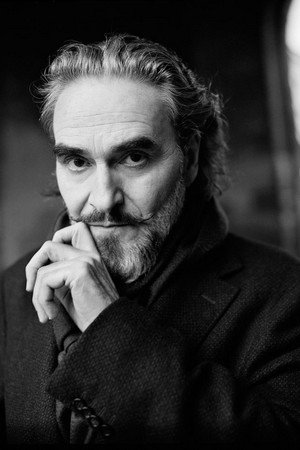Stephan Eicher (b. 1960)
Alias:
Grauzone
Birthplace:
Münchenbuchsee, Bern, Switzerland
Born:
August 17, 1960
Stephan Eicher (born 17 August 1960) is a Swiss singer. He sings in a variety of languages, including French, German, English, Italian, Swiss German and Romansh, sometimes using different languages in the same song. Eicher's success started in German-speaking countries in the 1980s when, as part of the band Grauzone, he had a hit single, Eisbär. With hit songs such as Combien de Temps and Oh Ironie, his popularity spread across Europe with albums, tours and chart success in France and Switzerland. Stephan Eicher was born in the rural municipality of Münchenbuchsee not far from Bern.His mother is Alsatian and his father is Yeniche. His father is also a musician. Eicher was educated at the Ecole d'Humanité, an international boarding school in Switzerland, and musically trained at the academy of art in Zürich, where he learned how to use the computer for composing music. He released his first single Eisbär, together with his brother Martin, on the album Grauzone in 1980. He became interested in French songs by Jacques Dutronc, Georges Brassens and Serge Gainsbourg, and these influences led to the album Les Chansons bleues. This album is also inspired by the American singers he listened to during his youth, such as Patti Smith, Johnny Cash and Bob Dylan. His two subsequent albums began to establish his reputation. The album, I Tell This Night, and the single Two People in a Room were released in 1985. It peaked on the Swiss charts at number ten and stayed twelve weeks. Two years later, the album Silence reached number three and was in the Swiss Top 10 for fourteen weeks. Both albums were created by Stephan Eicher almost single-handedly. 1989's My Place went in a different direction. The French lyrics were written by his friend, author Philippe Djian. His largest commercial success came in 1991 with the album Engelberg, which spent five weeks at number one in Switzerland and 46 weeks on the charts in total. The song Déjeuner en paix was also number two in France. It is the beginning of a collaboration with Manu Katché and Pino Palladino which lasted until the release of 1000 vies in 1996. His subsequent albums regularly reached the top five on the Swiss album charts. Following a world tour, which included concerts in Africa, he produced his first live album in 1994 (Non ci badar, guarda e passa). Since 1989, his song lyrics have been written by Djian. In 2001, Eicher released his first greatest hits compilation album entitled Hotel*s. For many years, the hotel Hess on the Swiss Engelberg was his second home. Martin Hess, the hotelier couple's son, became his close friend and producer. At the hotel, the albums Engelberg and Louanges developed. Eicher selected the title Hotel*s as homage to this grand hotel, which was torn down in the same year. For the title selection for the album, he let the fans co-ordinate with the official homepage. Source: Article "Stephan Eicher" from Wikipedia in English, licensed under CC-BY-SA.






